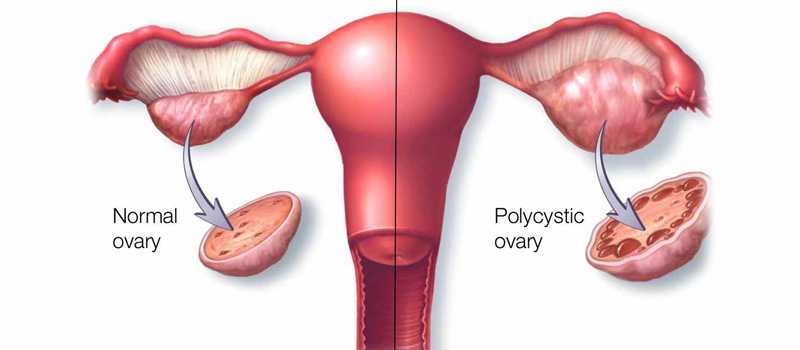
Gynaecology is the medical practice dealing with the female health and its reproductive systems (vagina, uterus and ovaries) and the breasts. It means "the science of women".
Here the consultation for all women health related problems is offered with evidence based treatment and women is also provided with the information which aims to help women make informed decisions about the treatment choices . The most common problems dealt are;

Polycystic ovary syndrome (PCOS) is a health problem that affects one in 10 women of childbearing age. Women with PCOS have a hormonal imbalance and metabolism problems that may affect their overall health and appearance. PCOS is also a common and treatable cause of infertility.
Polycystic ovary syndrome (PCOS), is a common health problem caused by an imbalance of reproductive hormones which creates problems in the ovaries. The ovaries make the egg that is released each month as part of a healthy menstrual cycle. With PCOS, the egg may not develop as it should or it may not be released during ovulation as it should be.
PCOS can cause missed or irregular menstrual periods. Irregular periods can lead to:
• Infertility (inability to get pregnant). In fact, PCOS is one of the most common causes of female infertility.
• Development of cysts (small fluid-filled sacs) in the ovaries.
Some of the symptoms of PCOS include:
• Irregular menstrual cycle. Women with PCOS may miss periods or have fewer periods (fewer than eight in a year). Or, their periods may come every 21 days or more often. Some women with PCOS stop having menstrual periods.
• Too much hair on the face, chin, or parts of the body where men usually have hair. This is called "hirsutism." Hirsutism affects up to 70% of women with PCOS.3
• Acne on the face, chest, and upper back
• Thinning hair or hair loss on the scalp; male-pattern baldness
• Weight gain or difficulty losing weight
• Darkening of skin, particularly along neck creases, in the groin, and underneath breasts
• Skin tags, which are small excess flaps of skin in the armpits or neck area
Yes. Having PCOS does not mean you can't get pregnant. PCOS is one of the most common, but treatable, causes of infertility in women. In women with PCOS, the hormonal imbalance interferes with the growth and release of eggs from the ovaries (ovulation). If you don't ovulate, you can't get pregnant.
Our treatment plan can help you ovulate and to raise your chance of getting pregnant
Yes, studies have found links between PCOS and other health problems, including:
• Diabetes. More than half of women with PCOS will have diabetes or pre-diabetes (glucose intolerance) before the age of 40.
• High blood pressure.
• Unhealthy cholesterol.
• Sleep apnea.
• Depression and anxiety.
• Endometrial cancer. Problems with ovulation, obesity, insulin resistance, and diabetes (all common in women with PCOS) increase the risk of developing cancer of the endometrium (lining of the uterus or womb).
There is no single test to diagnose PCOS.
• Physical Exam. blood pressure, body mass index (BMI), and waist size, skin for extra hair on your face, chest or back, acne, or skin discoloration.
• Pelvic exam.
• Pelvic ultrasound (sonogram). This test uses soundwaves to examine your ovaries for cysts and check the endometrium (lining of the uterus or womb).
• Blood tests. Blood tests check your androgen hormone levels, sometimes called "male hormones.” and thyroid disease, may also test your cholesterol levels and test you for diabetes.
There is no cure for PCOS, but you can manage the symptoms of PCOS.
• Doctor will work on a treatment plan based on your symptoms, your plans for children, and your risk for long-term health problems such as diabetes and heart disease.
You can take steps at home to help your PCOS symptoms, including:
• Losing weight. Healthy eating habits and regular physical activity can help relieve PCOS-related symptoms.
• Losing weight may help to lower your blood glucose levels, improve the way your body uses insulin, and help your hormones reach normal levels.
• Even a 10% loss in body weight (for example, a 150-pound woman losing 15 pounds) can help make your menstrual cycle more regular and improve your chances of getting pregnant.
PCOS can cause problems during pregnancy for you and for your baby. Women with PCOS have higher rates of
• Miscarriage
• Gestational diabetes
• Preeclampsia
• Cesarean section (C-section)
Your baby also has a higher risk of being heavy (macrosomia) and of spending more time in a neonatal intensive care unit (NICU).
You have several options to help your chances of getting pregnant if you have PCOS:
• Losing weight. If you are overweight or obese, losing weight through healthy eating, including eating the right amount of calories for you, and regular physical activity can help make your menstrual cycle more regular and improve your fertility.
• Medicine. After ruling out other causes of infertility in you and your partner, we might prescribe medicine to help you ovulate.
• Surgery. Surgery is also an option, usually only if the other options do not work. The outer shell (called the cortex) of ovaries is thickened in women with PCOS and thought to play a role in preventing spontaneous ovulation. Ovarian drilling is a surgery in which the doctor makes a few holes in the surface of your ovary using lasers or a fine needle heated with electricity. Surgery usually restores ovulation, but only for six to eight months